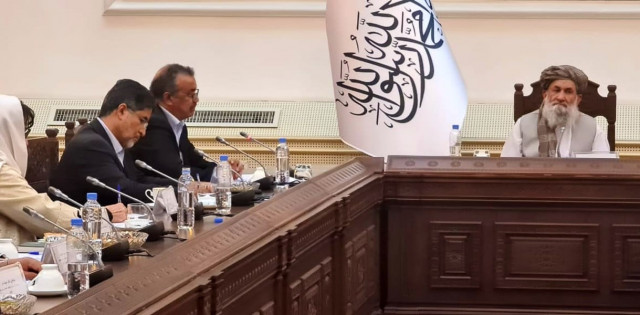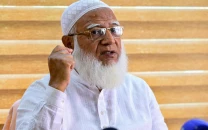Taliban call for international aid as WHO chief visits Kabul
Tedros Adhanom Ghebreyesus says the world health body will 'try to save Afghanistan from a humanitarian crisis'

The Taliban on Monday urged the international community to provide aid to Afghanistan during a meeting with Director-General World Health Organisation Tedros Adhanom Ghebreyesus, a spokesman of the group said.
“If the international community doesn’t provide aid in the health sector and other areas, Afghanistan will face a humanitarian crisis,” Spokesman of the Political Office Dr Mohammad Naeem quoted Afghanistan’s interim prime minister Mullah Hassan Akhund as saying on his official Twitter handle.
Akhund also appealed for an end to the freezing of funds in Afghanistan by several countries and institutions after the Taliban took over Kabul in August while demanding that the sanctions on Taliban leaders be lifted.
Also read: From Doha, EU limits diplomacy with Taliban to Afghan aid
“Pressures will not resolve the problems, they can be solved through dialogue. Those sanctions which are still in place should be removed,” the prime minister said in the presence of a WHO delegation led by Ghebreyesus, who arrived in Kabul Monday morning along with WHO regional head Ahmed Al-Mandhari.
7/11- بشري مرستې باید له سیاست نه جدا شي او په ازاده توګه دوام پیدا کړي.
— Dr.M.Naeem (@IeaOffice) September 20, 2021
مشکلات په فشارونو نه حل کیږي کیږي، بلکې په راشه درشه او تفاهم ښه حل کیدای شي.
شته بنديزونه باید ليري شي او مشکلات په خبرو او اترو حل شي
بندیزونه او فشارونه پخوانۍ ناکامه تجربه ده. pic.twitter.com/VBP4ZzQyfM
According to the Taliban, the WHO chief said that the body will “try to save Afghanistan from a humanitarian crisis” and “increase assistance.”
He admitted that the funds donated by the international community before they came to power “have been frozen”, and promised to try and get them released.
Hundreds of medical facilities in Afghanistan are at risk of imminent closure because the Western donors who finance them are barred from dealing with the new Taliban government, a WHO official said earlier this month.
Also read: SCO leaders ask US to engage with Taliban
UN health agency's regional emergency director Rick Brennan feared that around 90% of 2,300 health facilities across the country might have to be closed.
"We are going to have a pause in operations in a large proportion of those (health facilities). By some estimates, up to 90% will cease functioning probably later in the week and that will be associated with increased illness and death," Brennan said.
More than 18 million people, over half of Afghanistan's population, need humanitarian aid to survive.



















COMMENTS
Comments are moderated and generally will be posted if they are on-topic and not abusive.
For more information, please see our Comments FAQ